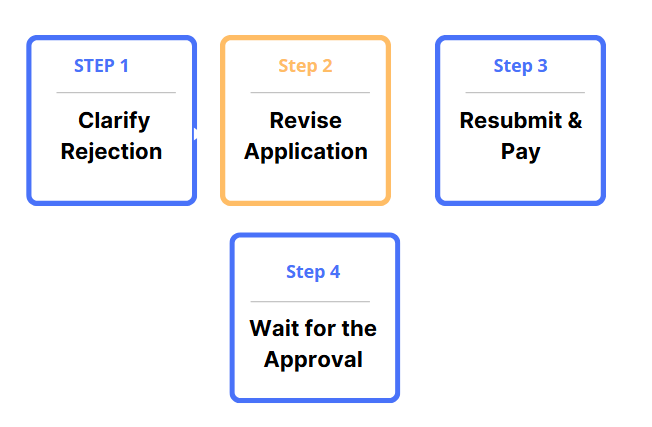Understanding the common reasons for these rejections might help you prepare a great application and improve your chances of a successful vacation to this beautiful Balkan country.

1. Incomplete or Incorrect Application Forms
Visa applications often face denial due to inaccurate application forms or missing documentation. It is crucial to ensure that all application sections are filled out truthfully and completely with information that is consistent, correct and matches your supporting documentation.
How to correct: Carefully review your application before submission, and cross-check all details with your supporting documents to ensure accuracy and completeness.
2. Insufficient Financial Means
Albanian authorities require visa applicants to demonstrate that they have enough funds to cover their expenses during their intended stay in the country and for their return journey. If you fail to provide adequate proof of sufficient financial resources, it is a valid reason for visa refusal.
How to correct: Submit recent bank statements, proof of income, or a sponsor letter confirming financial support that clearly meets the minimum funding requirements.
3. Lack of Strong Ties to Your Home Country
Applicants must demonstrate strong ties to their home country. These ties can include various factors, such as:
- Employment: A stable job with a long-term contract can indicate a strong reason to return.
- Property Ownership: Owning property in your home country demonstrates significant ties.
- Family Relationships: Close family ties, such as a spouse, children, or dependent parents, can compel you to return.
Failing to establish these ties can raise concerns about the applicant's intentions and lead to visa denial.
To strengthen your application: Provide evidence such as an employment letter, property ownership documents, or family-related documentation that clearly demonstrates your commitment to returning home.
4. Previous Visa Violations
If you have a history of overstaying a previous visa in Albania or any other country or have been deported, such behaviour will negatively impact your current visa application, which is a strong reason for rejection. Immigration authorities share information, and past violations are taken very seriously.
To address this: Include a formal written explanation with your application acknowledging the past violation, demonstrating accountability, and providing evidence of compliance with immigration rules since then.
5. Failure to Meet Specific Visa Requirements
Each visa category has particular Visa requirements that you must meet. To illustrate, a tourist visa application may necessitate a confirmed travel itinerary and proof of lodging, whereas a work visa application typically requires a valid work permit and an employment contract. Non-compliance with these distinct requirements can lead to visa rejection.
To prevent rejection: Carefully review the specific requirements for your visa category and ensure all mandatory documents—such as travel plans, accommodation proof, or work contracts—are accurately provided and up to date.
6. Criminal History
If you have a criminal record, particularly for serious offences, or if the Albanian authorities have security concerns related to your entry, your visa application will likely be denied. They conduct checks against international databases and may refuse entry to individuals deemed a threat to public order or national security.
To address this: Provide official police clearance certificates and, if applicable, a legal explanation or rehabilitation documentation to demonstrate that you no longer pose a risk and have complied with all legal requirements.
7. Misrepresentation or Fraudulent Documents
Providing any false or misleading information in your application or submitting forged documents (e.g., fake bank statements, counterfeit invitation letters, etc.) is a serious offence and will almost certainly lead to visa rejection and potential future bans from entering Albania. Immigration authorities are trained to detect fraudulent submissions.
To correct this: Ensure that all information and documents submitted are truthful, verifiable, and authentic, and if a past misrepresentation occurred, include a formal statement of clarification and supporting evidence to rebuild credibility.
8. Unclear Purpose of Visit
Your application may be denied if the purpose of your visit is unclear or doesn't match your visa type. For instance, if you apply for a tourist visa but your supporting documents suggest you intend to work, or if your business activities exceed what is permitted under a business visitor visa, this discrepancy can lead to refusal.
To avoid this: Clearly align your visa type with the intended activities and submit consistent, detailed supporting documents that accurately reflect the purpose and duration of your visit.
9. Failure to Meet Specific Requirements for Your Nationality
Visa requirements can vary depending on your citizenship. You might fail to meet a specific Albania visa requirement that applies to your nationality, such as mandatory interviews, specific forms, or additional supporting documents. It is essential to consult the exact requirements outlined by the Albanian embassy or consulate in your country for your specific passport.
To correct this: Carefully review the specific visa requirements for your nationality as outlined by the embassy or consulate and ensure all necessary forms, documents, and procedures are followed accordingly.
10. Submitting Documents Not Properly Translated or Authenticated
You may need to provide official translations if your supporting documents aren't in English or Albanian. Additionally, certain documents need to be notarised or apostilled to be considered valid. Failure to provide properly translated and authenticated documents as required can lead to rejection.
To correct this: Ensure all non-English or non-Albanian documents are officially translated and notarised, as required, before submission to meet the visa application standards.
11. Applying Too Early or Too Late
While not always a direct reason for rejection, applying significantly too early might lead to your application being considered premature, especially if supporting documents (like bank statements) become outdated by your intended travel date. Conversely, applying too late may not allow sufficient processing time, although this typically leads to administrative delays rather than outright rejection, unless it is clear you won’t receive the visa before your intended travel.
To correct this: Apply within the recommended timeframe—neither too early nor too late—ensuring that all supporting documents are current and there is enough time for processing before your intended travel date.
Reapplication After Albania eVisa Rejection
The steps below outline a clear path to help you address the issues and resubmit your eVisa request effectively.

Step 1: Clarify Rejection: Understand the exact reason(s) for your previous eVisa denial by carefully reviewing the communication. Contact the Albania Customer Support Team if needed.
Step 2: Revise Application: Revisit the Albania eVisa Application Form ,ensuring all fields are completed accurately and truthfully, paying close attention to all details. Upload all the necessary supporting documents, ensuring they are correct, complete, and meet the specified format and validity requirements based on the rejection reason.
Step 3: Resubmit & Pay: Submit your updated application online and carefully follow the instructions to pay the eVisa fee again. Keep proof of payment.
Step 4: Wait for the Approval: After you have resubmitted your application and paid the fee, your application will be processed. Be patient, as processing times can vary, and regularly checking the tracking eVisa status for updates is advisable.
Conclusion
Navigating the Albania visa process demands precision and thoroughness. By understanding common pitfalls and addressing any previous rejection with diligence, you significantly enhance your chances of a successful eVisa application. Prepare meticulously, adhere to all requirements, and look forward to exploring the wonders of Albania.
Frequently Asked Questions
Besides the eVisa, Albania offers various other visa categories depending on the purpose of your visit, such as long-stay visas for work, study, family reunification, and diplomatic/official visas. The requirements and application processes for these visas differ from the eVisa.
Your passport should be valid for at least three months beyond your intended date of departure from Albania. However, it is often recommended to have at least six months of validity remaining for international travel to avoid any unforeseen issues.
A visa rejection from one country may affect your visa applications to others, as it becomes part of your immigration history. However, it doesn't automatically guarantee a rejection from other countries. Each country has its evaluation criteria. It's important to be transparent about previous rejections in future applications.
Generally, a visa rejection itself doesn't have a specific expiry date that would permanently bar you from applying again in the future. However, the reasons for the rejection could have significant implications. For instance, there may be long-term repercussions if someone is rejected because they committed a serious crime. If you address the reasons for the initial rejection and meet the current requirements, you can reapply after the standard waiting period.
Content Disclaimer: Please be informed that these facts were last updated in January 2026. We suggest you verify with the appropriate agencies, embassies, and airlines to ensure complete accuracy regarding your travel plans.

To help us improve